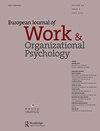Negative work events impede daily self-efficacy through decreased goal attainment: Are action orientation and job autonomy moderators of the indirect effect?
IF 3.4
2区 心理学
Q2 MANAGEMENT
European Journal of Work and Organizational Psychology
Pub Date : 2023-01-24
DOI:10.1080/1359432X.2023.2166832
引用次数: 0
Abstract
ABSTRACT Work-related self-efficacy has been found to predict outcomes such as daily work motivation and performance. However, the way in which self-efficacy changes within workdays and how such changes emerge remain unclear. This study integrates research on work events with a self-regulation perspective to explain changes in daily self-efficacy. We argue that negative events hamper daily goal attainment, reducing employees’ self-efficacy. We also investigate differences in employees’ reactivity to negative events, assuming that the strength of the indirect effect differs based on their ability to self-regulate in threatening and demanding situations (indicated by threat- and demand-related action orientation) and to make autonomous decisions (indicated by job autonomy). The model was tested in a diary study across five workdays (N = 101 individuals). The findings indicate that decreased goal attainment explains impairments in self-efficacy on days with more negative events. The negative relationship was stronger for employees with lower demand-related action orientation. However, the indirect effect was not contingent on threat-related action orientation and job autonomy. Our findings contribute to the self-efficacy literature and the growing research on work events by providing knowledge regarding the mechanisms and conditions that can partially explain how and when negative work events reduce employees’ daily self-efficacy.消极的工作事件通过降低目标实现来阻碍日常自我效能感:行动取向和工作自主性是间接效应的调节因素吗?
与工作相关的自我效能感已被发现可以预测日常工作动机和表现等结果。然而,自我效能感在工作日内的变化方式以及这种变化是如何出现的仍不清楚。本研究将工作事件研究与自我调节视角相结合,以解释日常自我效能感的变化。我们认为,负面事件阻碍了日常目标的实现,降低了员工的自我效能。我们还调查了员工对负面事件反应的差异,假设间接影响的强度不同于他们在威胁和要求的情况下的自我调节能力(由与威胁和要求相关的行动导向表示)和自主决策能力(由工作自主表示)。该模型在五个工作日的日记研究中进行了测试(N = 101个人)。研究结果表明,目标实现率的下降解释了在负面事件较多的日子里自我效能感的下降。与需求相关的行动取向较低的员工的负面关系更强。然而,间接影响并不取决于与威胁相关的行动导向和工作自主性。我们的研究结果通过提供有关机制和条件的知识,为自我效能文献和越来越多的工作事件研究做出了贡献,这些机制和条件可以部分解释负面工作事件如何以及何时降低员工的日常自我效能。
本文章由计算机程序翻译,如有差异,请以英文原文为准。
求助全文
约1分钟内获得全文
求助全文
来源期刊
CiteScore
8.00
自引率
2.30%
发文量
40
期刊介绍:
The mission of the European Journal of Work and Organizational Psychology is to promote and support the development of Work and Organizational Psychology by publishing high-quality scientific articles that improve our understanding of phenomena occurring in work and organizational settings. The journal publishes empirical, theoretical, methodological, and review articles that are relevant to real-world situations. The journal has a world-wide authorship, readership and editorial board. Submissions from all around the world are invited.

 求助内容:
求助内容: 应助结果提醒方式:
应助结果提醒方式:


